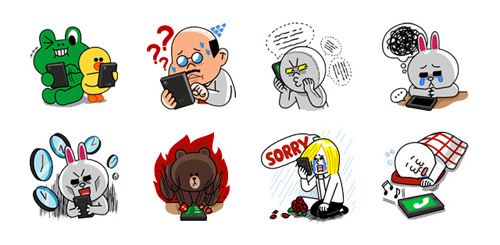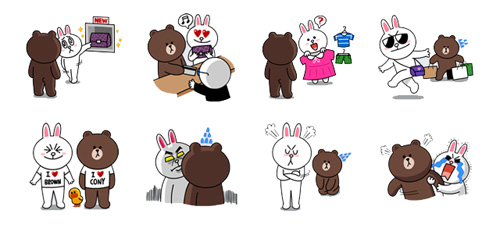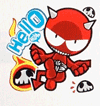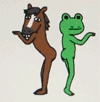The Sticker Wars: WeChat’s creatives go up against Line (updated)
ICYMI, the background for this story:
- “Line” is a chat app for iOS/Android.
- It’s from Japan.
- It sells different sets of stickers, well-illustrated emoticons.
- Line is probably the first chat app to find a booming revenue model. (See TNW.)
- Other chat apps (WeChat, KakaoTalk, Kik) have caught on and have quickly implemented their own version of stickers.
In this feature on 88 Bar, we analyze Line’s sticker success and look at how China’s WeChat has caught up.
The incumbent: Line
Line’s core line of stickers is quite something. Cute characters, stark expressions, and plenty of comical situations that are just vague enough to apply to whatever situation might come up in a conversation. (It really works; I’ve bought nine sticker sets to date myself on top of a dozen or so free ones.)
They are also distinctly Japanese – the art style is very clean; people and creatures have large heads; the expressions are based on Japanese manga conventions…

But most importantly, the most popular stickers, which involves the love story between a bear and and a bunny, mirror stereotypical (East Asian) male-female relationship dynamics:

Not only has Line created a great set of their own stickers, but they’ve managed to rope in some of Japan’s most popular cartoon characters – Hello Kitty, Doraemon, Dragonball – as well as some from America – Spongebob SquarePants, Donald Duck, Snoopy. Line also runs many time-limited promotions; their “Pray for the Philippines” stickers, following the recent devastating typhoon was pure genius (it even donated the proceeds to a charity!).
At first, it seemed that WeChat’s sole innovation with its stickers system was that they were animated. My favorite example is that when they launched, they had already licensed the now Turner-owned Tuzki line of emoticons that were all the rage on the Chinese internet (albeit 5-10 years ago).
Editor’s note: Please note all animations below have been reproduced by hand as GIFs. The actual stickers contain smoother animations than what we’ve depicted below.

But aside from Tuzki, their initial sticker packs felt somewhat weaker. Some resembled Line’s Japanese creations but without the punch:

While others had a flat, commercial personality:

More importantly, these sticker sets did not capture the nuanced emotions and complex backstories that are the hallmark of a Line sticker and that make it a great conversational lubricant.
But recently WeChat’s stickers have started to develop a style of its own. The recent sticker packs are great not because they try to mimic the polished, “Hello Kitty” style from Line; they succeed because they’re whacky, weird and funny in their own way. There’s a very Chinese flavor to them; the grainy lines, absurd sense of humor and adult style all remind me of the kind of illustration and design coming out of China today.

What’s interesting is that the stickers themselves aren’t always created in Mainland China; many are from Hong Kong (Old Girl, Fatina, AH FEI@GAL), Taiwan (Sinkcomic) and even their Japanese acquisitions aren’t as clean and cute as the Line products.

It’s still too early to tell whether WeChat’s sticker system will continue to evolve. But as it stands, it’s already catching up to Line, and jumping ahead of its competitors (Kik and KakaoTalk both had relatively immature sticker systems, with only a handful of sticker sets or with no free stickers respectively).
***
Update 24 Apr 2014: Through conversations within our group, we’ve noticed that WeChat offers different sets of stickers on their store depending on where (they think) you live. So the stickers cited in my article may disproportionately represent Hong Kong because WeChat knows I’m based here. Right now, this geographic targeting seems minor as the majority of the stickers seem to be offered to both people living in Hong Kong and the US (our two test cases).
Update 26 June 2014: Line is testing the waters with their first animated sticker pack featuring their core characters. Launched June 12.
This article is licensed under a Creative Commons Attribution-NonCommercial 4.0 International License.